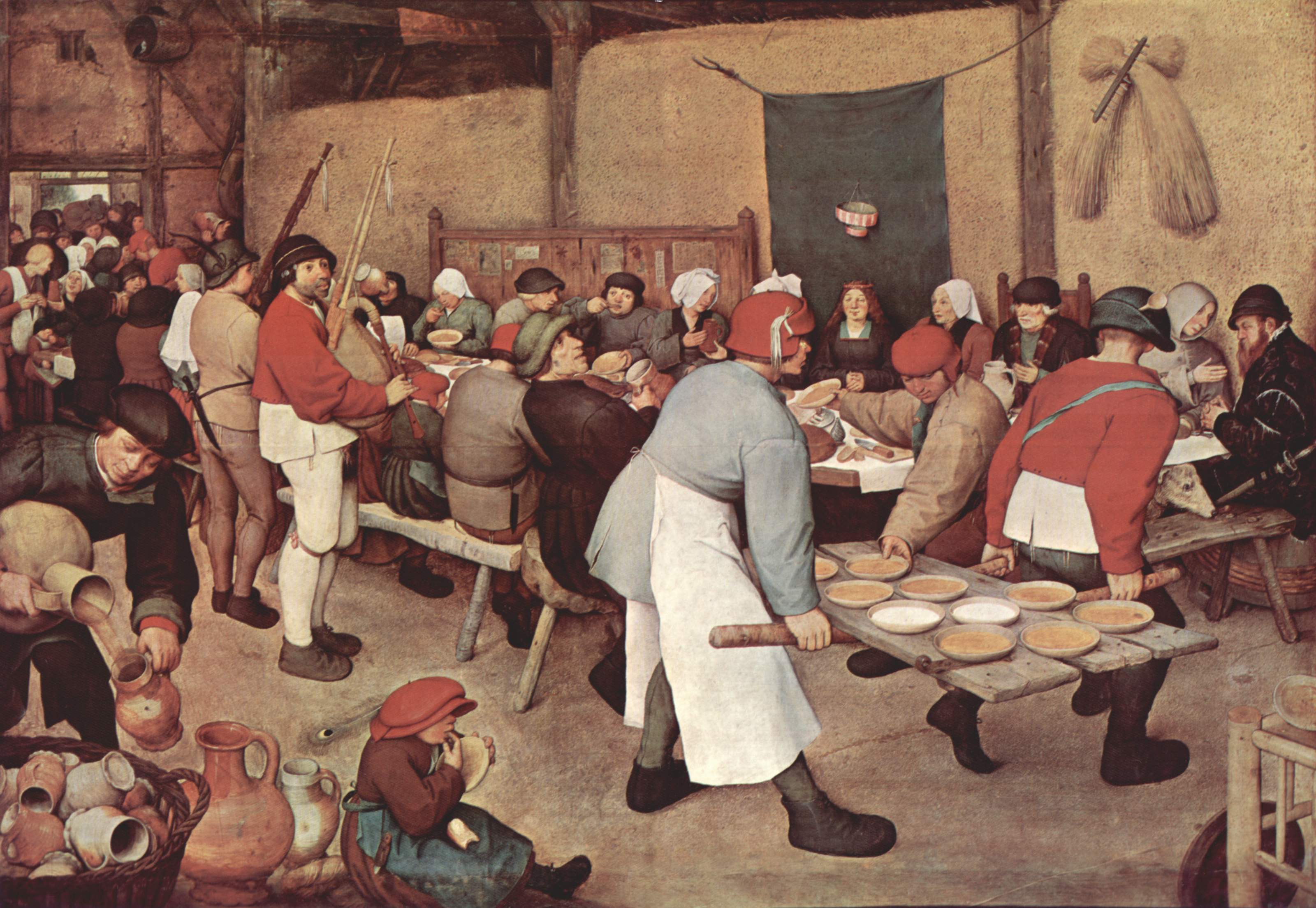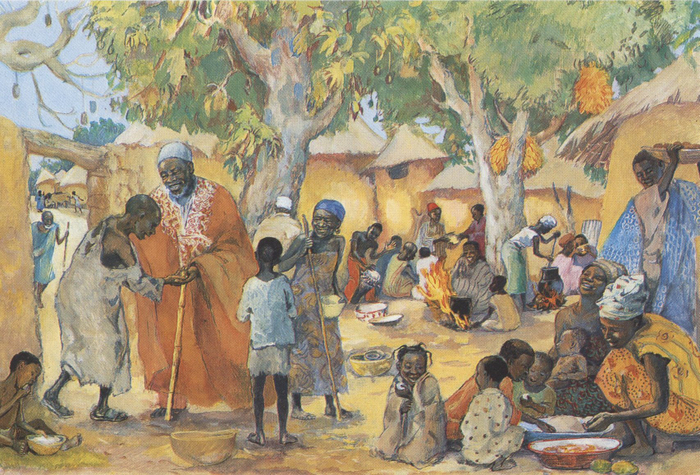Sermon preached at Duston United Reformed Church on 11th October 2020. Texts: Isaiah 25:4-8; Luke 14:15-24.
All the passages we’ve heard today – from Psalm 23, from Isaiah, and from Luke – are to do with feasting. The word feast is perhaps a little old-fashioned now. It conjures up images of Oxford colleges or medieval banquets, it belongs to the world of Henry VIII or Hogwarts. Indeed, there are many memorable feasts in the Harry Potter books. Here’s how JK Rowling writes about the first one that Harry encounters, fresh from his unhappy cupboard under the stairs:
"Harry’s mouth fell open. The dishes in front of him were now piled with food. He had never seen so many things he liked to eat on one table: roast beef, roast chicken, pork chops and lamb chops, sausages, bacon and steak, boiled potatoes, roast potatoes, chips, Yorkshire pudding, peas, carrots, gravy, ketchup and, for some strange reason, mint humbugs."Harry’s reaction is an important one, because although he was never starved at his terrible aunt and uncle’s house, he never had quite enough and never got the nicest things. In the same way, in a poor society where people are just scraping by, feasting on special occasions, every now and then, becomes really important. It’s a time to put away your everyday poverty and go wild for a brief time.
 |
| Image: The Peasant Wedding by Pieter Brueghel, via Psephizo.com |
Let’s talk about food poverty in the world today for a moment, to put this in context. According to the most recent estimates, more than 800 million people across the world, roughly 1 in 9 of the world’s population, are undernourished – they don’t have enough food to live a normal active everyday life. This figure had been declining as a result of many international efforts, but it’s started to rise again in the past few years.
As you might have heard, the United Nations’ World Food Programme has just been awarded the Nobel Peace Prize. They give direct assistance to the very poorest people in the world, more than 100 million people, and their work has been all the more important during the coronavirus pandemic. Food and hunger really matter. The World Food Programme’s director, David Beazley, said the following after the announcement of the prize:
"Where there is conflict, there is hunger. And where there is hunger, there is often conflict. Today is a reminder that food security, peace and stability go together. Without peace, we cannot achieve our global goal of zero hunger; and while there is hunger, we will never have a peaceful world."
Nor is this just a problem of so-called less developed countries elsewhere in the world. In our own rich country, according to Oxfam, more than two million people are undernourished, and half a million people are reliant on food parcels. This is a national and a global scandal. Helping individuals such as happens here with the food bank is really important, but ultimately we need deep changes to the systems which allow so many people to go hungry.
Returning to the world of ancient Israel, they lived in an agricultural society where many people were only one harvest away from starvation. The wider middle eastern area from Iraq to Egypt, including Israel, was known as the Fertile Crescent for its benign climate for growing crops, compared to many other areas, but there were frequent famines and disasters. In that world, feasting took on a deeper symbolism. It was a rare and special event. You couldn’t rely on it, and it felt like a gift from God.
As a result, many societies have ritualised such feasts, built them into religious traditions of all sorts, and ancient Israel had plenty of those. It also had a deeper significance, in that feasting was a key image of what they looked forward to when God brought about a better world in the future, in the end times. Thus the prophets are full of accounts of the future time when God will make a great feast, a banquet of rich foods and fine wines, in the way that we saw from Isaiah. There’s no sense of this being a different place – this is a new earth rather than heaven – but it’s a world transformed, a world of justice and peace, a world where everyone is welcome and everyone is fed.
And it’s that sort of feast that Jesus was talking about in his parable of the great banquet. It’s quite a complex story, of people being invited and refusing and then others put in their place. I have to confess that I’m not using the version of the parable that’s in the lectionary for today. We should be hearing the parable from the gospel of Matthew, which tells roughly the same story but adds layers of violence, exclusion and pretty blatant anti-semitism. Luke’s version is neater, has fewer layers, and is a lot less problematic. But there’s still a lot going on.
 |
| Image: Jesus Mafa, via Vanderbilt University |
Now it’s not obvious from the text, but invitations in the time of Jesus were quite unlike in our time. Today when you’re invited to a dinner or a celebration, you’re told the time and place. In Jesus’ time, the guests were invited well in advance, agreed to come, and only later would they be told when the celebration was actually happening. So those excuses are partly because something else had come up in the mean time, those people who’d bought land or oxen, or who’d just got married. They’re partly to do with the time that had elapsed between the initial invitation and getting the details. I’ve done that myself at work – said I was free for a meeting on a range of dates, then had some of those dates fill up. It’s not necessarily that you don’t want to make the date, but it’s certainly a matter of priorities. The people invited simply don’t find the dinner as important as the other things they’ve got on. Now this parable has often been read allegorically, with lots of different groups reckoned to be the various people who reject the invitation, but I suggest that a simpler reading is easier: some people were invited to the feast, but they couldn’t make it any more because they had more important things to do.
And understandably, this would be pretty hurtful to the person giving the feast. They’d put in lots of effort and money planning this feast, and their guests don’t want to come. That’s a pretty horrible feeling. I’ve organised various events, in churches or at work or socially, and the start time was approaching, and people weren’t turning up, and my heart began to sink.
So I can readily imagine how the organiser of the feast might have felt by all those rejections. I think we can assume that he was a person of some high standing, so that all those rejections would have impacted on his social status as well, made him look less important.
He begins to sound pretty angry about the whole thing. “Go out at once into the streets and lanes of the town and bring in the poor, the crippled, the blind, and the lame” and then later when that’s not enough, “Go out into the roads and lanes, and compel people to come in, so that my house may be filled”. There’s a fair amount of grumpiness in that, but also a great deal of generosity. If we reckon that this man is rich, and was expecting lots of important guests at the feast, then it’s quite a shift to bring in the poor, the crippled, the blind and the lame. In a typical large social event of the time, those are the people who’d be at the far end of the table from the host, perhaps with less good food, if they got an invitation at all. But immediately before this parable, Jesus instructs those holding a feast to invite the poor, the crippled, the blind and the lame rather than relatives or rich neighbours, as those people can’t repay you through a return invitation. And the treatment of people like these who the Hebrew prophets constantly held up as the example of justice in society – doing God’s work is to care for widows, orphans, refugees and the disabled. It turns a typical middle eastern banquet for the privileged into what one commentator, Leith Fisher, called “the rugged folk’s banquet”.
 |
| Image: The Additional Needs Blogfather |
So I think this parable is a call to generosity for those who have power and money and privilege, both individuals and society, to consider first those people who are disadvantaged. Stronger than that, it’s a statement that this is the way of the kingdom of God, to welcome all and to include all. The kingdom of God upends the structures of society. The rich, the leaders, the privileged in private jets and expensive houses – they come last; the poor, the downtrodden, the marginalised – they come first in God’s kingdom.
It’s a call to the church as well, to be a place of inclusion rather than exclusion. The hymn we heard before the sermon says that ‘all are welcome in this place’. It’s so wrong, indeed it’s breaking the clear word of Jesus in this parable, when churches turn away from their doors those who are disabled, or young children, or old people, or gay people, or people with autism, or transgender people, or people who don’t live locally, or people who aren’t enough like those in the existing congregation. The last hymn we’ll hear today begins “come all you vagabonds, come all you ‘don’t belongs’” and it was written based on this parable. Because that’s what the church is, or at least that’s what the church should be – the home of those who don’t belong, the home of the marginalised and the excluded.
And to me that’s a message of great hope. Because these are really rubbish times for a lot of people, but in those times that signs of hope are needed, and where messages like the feasts shown by Isaiah and by Jesus are so important. But they say: if you’re marginalised, if you’re on the edge of society in whatever way – then YOU are welcome at the table of the Lord. YOU are the invited guest at the great banquet. And YOU are beloved by God, in this time and in the world to come.
Amen.






